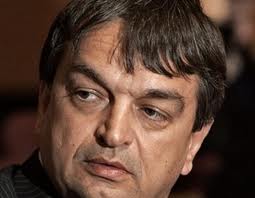By Andrew Warshaw, chief correspondent
March 12 – Former FIFA administrator Jerome Champagne has not ruled out running for President if, as expected, Sepp Blatter steps down in two years’ time. Since leaving FIFA under a cloud in 2010 after 11 years, the multi-lingual former French diplomat has been primarily working as an international football consultant in the field of development as he considers his next heavyweight move.
UEFA president Michel Platini and FIFA general-secretary Jerome Valcke have both been discussed as possible successors to Blatter but Champagne’s name is increasingly being mentioned as a possible progressive alternative.
“I have not decided that I would run, nor have I decided that I will not run,” Champagne told Inside Sport Africa magazine in an interview. “It is important to reconcile football, its institutions with the people of football. Football is the sport of the people.”
Champagne insists the eligibility rules for FIFA’s executive committee must be mainly restricted to national federation heads and not just any candidate with sufficient regional votes. “The confederations play a big role in world football but they are not members of FIFA,” he said. “The FIFA members are the national associations! This is why I advocate that a majority of seats in the FIFA Executive Committee be reserved to Presidents of national associations.”
Champagne, who was Blatter’s international relations director, has been monitoring the various goings-on at FIFA with interest and last year caused a stir when he launched a 26-page policy document called “Which FIFA for the 21st Century”.
That was his second contribution to the debate on the future of FIFA, viewed by some as a deliberate campaign of self-promotion but including several sensible and well-thought-out proposals. In his third paper, released this week running over 10 pages, Champagne supports the use of goalline technology – in stark contrast to the views of Michel Platini. “It is an illusion to think that it can be disregarded in football,” Champagne writes.
He also says the time has come to revisit the debate over home-grown players – or lack of them. “Either the rules are ineffective or they have been circumvented (for example by naturalising players), or clubs abuse the lack of truly restrictive rules in order to deprive other clubs of their young players,” he writes.
Describing the European Club Association as “more elitist than democratic”, Champagne adds: “The proportion of players developed in clubs has never been so low while, at the same time, the best non-European players gravitate towards Europe, depriving non-European leagues of their talents and undermining their local championships in home countries.”
Champagne also urges FIFA not to be unduly influenced by political conflicts when it comes to football. “FIFA must find appropriate solutions to allow the basic right for everyone to play football to be respected.”
One way of doing this, he says, would be to create “a category of ‘associate’ members that will enable support and ‘international’ activities in territories whose associations are unable to become members of FIFA, by devising creative and/or temporary solutions to a wide range of complex situations (Kosovo, Greenland, French overseas departments and territories) in order to authorise international football.”
“Finally, although FIFA is not in a position to act as a peacemaker, it should take every possible initiative to create a tradition of ‘football diplomacy’, designed to reduce regional conflicts and demonstrate that sport is blazing a trail ahead of ‘politics’ and not trailing behind it.”

